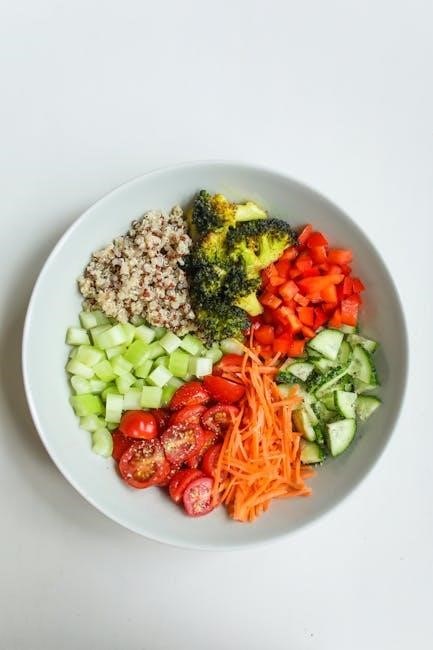Dietary management is crucial for peptic ulcer patients, and a
specific diet
can help alleviate symptoms, according to recent
studies
on diet for peptic ulcer pdf available online.
Definition of Peptic Ulcer
A peptic ulcer is a sore that develops on the inside lining of the stomach and the upper portion of the small intestine, according to various online sources, including diet for peptic ulcer pdf.
The most common symptoms of a peptic ulcer include abdominal pain, feeling full after eating, and weight loss.
A peptic ulcer can be a gastric ulcer, which occurs in the stomach, or a duodenal ulcer, which occurs in the duodenum, the first part of the small intestine.
Peptic ulcers are usually caused by an infection with the bacterium Helicobacter pylori or by the use of nonsteroidal anti-inflammatory drugs, such as ibuprofen and aspirin.
Understanding the definition of a peptic ulcer is essential for developing an effective treatment plan, including dietary changes.
Dietary management plays a crucial role in managing peptic ulcer symptoms and promoting healing.
A healthcare provider can diagnose a peptic ulcer using endoscopy, imaging tests, or blood tests.
A proper diagnosis is necessary to determine the best course of treatment for a peptic ulcer.
Online resources, such as diet for peptic ulcer pdf, provide valuable information on peptic ulcers and their management.
These resources can help individuals understand their condition and make informed decisions about their treatment.
By understanding the definition of a peptic ulcer, individuals can take the first step towards managing their condition and improving their overall health.
With the right treatment and dietary changes, it is possible to manage peptic ulcer symptoms and prevent complications.
A comprehensive treatment plan, including dietary management, can help individuals with peptic ulcers achieve relief from their symptoms and improve their quality of life.
Causes and Symptoms of Peptic Ulcers
Peptic ulcers are caused by an imbalance between the digestive enzymes and the protective lining of the stomach and intestines.
According to online sources, including diet for peptic ulcer pdf, the most common causes of peptic ulcers are infection with the bacterium Helicobacter pylori and the use of nonsteroidal anti-inflammatory drugs.
Symptoms of peptic ulcers may include abdominal pain, bloating, and discomfort, as well as nausea, vomiting, and diarrhea.
In some cases, peptic ulcers can cause more severe symptoms, such as bleeding, perforation, and obstruction.
The symptoms of peptic ulcers can vary depending on the location and severity of the ulcer.
A healthcare provider can diagnose peptic ulcers using a combination of medical history, physical examination, and diagnostic tests, such as endoscopy and imaging studies.
Online resources, such as diet for peptic ulcer pdf, provide valuable information on the causes and symptoms of peptic ulcers, as well as treatment options and dietary management.
Understanding the causes and symptoms of peptic ulcers is essential for developing an effective treatment plan and preventing complications.
By recognizing the symptoms of peptic ulcers, individuals can seek medical attention and receive prompt treatment.
Early treatment can help prevent long-term damage and improve overall health outcomes.
A comprehensive understanding of the causes and symptoms of peptic ulcers is crucial for managing the condition and improving quality of life.

Dietary Management for Peptic Ulcers
Dietary management involves eating a balanced diet with foods that help heal ulcers, as discussed in diet for peptic ulcer pdf online resources daily.
Recommended Diet for Peptic Ulcers
A recommended diet for peptic ulcers typically includes foods that are low in acid and gentle on the stomach, as outlined in various diet for peptic ulcer pdf resources.
A diet rich in fruits, vegetables, and whole grains can help alleviate symptoms and promote healing.
Foods such as lean proteins, low-fat dairy products, and healthy fats like olive oil are also beneficial.
It is essential to avoid trigger foods that can irritate the stomach and worsen symptoms, such as spicy, fatty, or high-fiber foods.
Additionally, small, frequent meals can help manage symptoms and reduce discomfort.
A healthcare professional or registered dietitian can provide personalized guidance on the best diet for managing peptic ulcers.
By following a recommended diet and making lifestyle changes, individuals with peptic ulcers can help manage their symptoms and promote healing.
A well-planned diet can also help prevent future episodes and reduce the risk of complications.
Overall, a balanced and gentle diet is crucial for managing peptic ulcers and promoting overall health and well-being.
It is essential to work with a healthcare professional to develop a personalized diet plan.
Foods that May Help Fight Peptic Ulcers
Certain foods may help fight peptic ulcers, as discussed in various diet for peptic ulcer pdf resources.
Foods high in antioxidants, such as berries, leafy greens, and other fruits and vegetables, can help reduce inflammation and promote healing.
Probiotic-rich foods like yogurt, kefir, and fermented vegetables can also help maintain a healthy gut microbiome.
Additionally, foods rich in fiber, such as whole grains, legumes, and nuts, can help regulate digestion and reduce symptoms.
Omega-3 fatty acids found in fatty fish, flaxseeds, and chia seeds may also help reduce inflammation and promote healing.
It is essential to note that while these foods may be beneficial, they should be consumed as part of a balanced diet and in moderation.
A healthcare professional can provide personalized guidance on the best foods to include in a diet for peptic ulcers.
By incorporating these foods into a diet, individuals with peptic ulcers may be able to manage their symptoms and promote healing.
A well-planned diet can also help prevent future episodes and reduce the risk of complications.
Overall, a balanced diet that includes a variety of whole foods can help support overall health and well-being.

Nutritional Supplements for Peptic Ulcers
Supplements like probiotics and omega-3 fatty acids may help alleviate symptoms, as discussed in diet for peptic ulcer pdf resources online daily.
Use of Dietary Supplements
The use of dietary supplements is a common practice among individuals with peptic ulcers, as they can help alleviate symptoms and promote healing. According to various studies and resources available online, including diet for peptic ulcer pdf, certain supplements such as probiotics, omega-3 fatty acids, and vitamin C can be beneficial in managing peptic ulcer disease. These supplements can help reduce inflammation, improve digestive health, and enhance the body’s natural healing processes. Additionally, some supplements may help protect the stomach lining and prevent future ulcers from forming. It is essential to consult with a healthcare professional before taking any dietary supplements, as they can interact with medications or have adverse effects in certain individuals. By incorporating the right supplements into their diet, individuals with peptic ulcers can experience improved symptoms and enhanced overall health. A well-informed approach to using dietary supplements can make a significant difference in managing peptic ulcer disease.
Beneficial Supplements for Peptic Ulcers
Certain supplements have been found to be beneficial in managing peptic ulcers, according to research and resources such as diet for peptic ulcer pdf. Probiotics, for example, can help maintain a healthy gut microbiome, which is essential for proper digestion and reducing inflammation. Omega-3 fatty acids, particularly EPA and DHA, have anti-inflammatory properties that can help soothe the stomach lining and promote healing. Vitamin C is also important, as it can help boost the immune system and enhance the body’s natural healing processes. Other beneficial supplements include zinc, which can help protect the stomach lining, and turmeric, which has anti-inflammatory and antioxidant properties. These supplements can be taken in various forms, including capsules, tablets, or powders, and can be incorporated into a comprehensive treatment plan for peptic ulcers. By taking the right supplements, individuals with peptic ulcers can experience improved symptoms and enhanced overall health, as supported by online resources and diet for peptic ulcer pdf. A healthcare professional can provide guidance on the best supplements to take.

Meal Plan for Peptic Ulcer Disease
A well-structured
- meal plan
helps manage symptoms, as seen in diet for peptic ulcer pdf online resources and guides.
Sample Meal Plan
A sample meal plan for peptic ulcer disease typically includes foods that are low in acid and fat, and high in fiber, as outlined in various diet for peptic ulcer pdf resources.
The plan may consist of meals such as oatmeal with fruit, lean proteins like chicken or fish, and steamed vegetables like carrots and green beans.
It is also recommended to drink plenty of water and other non-caffeinated fluids to stay hydrated and help heal the stomach lining.
A
- daily meal plan
may look like this: breakfast options include scrambled eggs or yogurt with honey, lunch options include grilled chicken or fish with cooked vegetables, and dinner options include lean beef or pork with roasted potatoes and steamed broccoli.
By following a balanced and nutritious meal plan, individuals with peptic ulcer disease can help manage their symptoms and promote healing;
It is essential to consult with a healthcare professional or registered dietitian to develop a personalized meal plan that meets individual needs and health goals, as discussed in diet for peptic ulcer pdf guides.
This will help ensure that the meal plan is tailored to the specific needs of the individual and promotes optimal healing and symptom management.

Guidelines for Reducing Peptic Ulcer Symptoms
To reduce peptic ulcer symptoms, it is essential to follow a set of guidelines as outlined in diet for peptic ulcer pdf resources.
These guidelines include eating smaller, more frequent meals to reduce stomach acid production, and avoiding foods that can trigger symptoms, such as spicy or fatty foods.
A
- list of trigger foods
may include citrus fruits, tomatoes, and chocolate, which can irritate the stomach lining and exacerbate symptoms.
Additionally, it is recommended to avoid smoking and limit alcohol consumption, as these can also irritate the stomach and worsen symptoms.
By following these guidelines and making lifestyle changes, individuals with peptic ulcers can help manage their symptoms and promote healing.
It is also important to work with a healthcare professional to develop a personalized plan for reducing symptoms and promoting overall health, as discussed in diet for peptic ulcer pdf guides.
This plan may include dietary changes, lifestyle modifications, and other interventions tailored to the individual’s specific needs and health goals.
